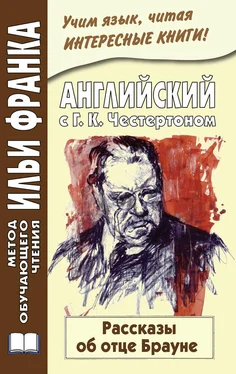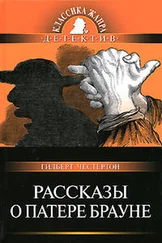
 Suppose the servant really killed the master, or suppose the master isn’t really dead, or suppose the master is dressed up as the servant, or suppose the servant is buried for the master; invent what Wilkie Collins’ tragedy you like, and you still have not explained a candle without a candlestick, or why an elderly gentleman of good family should habitually spill snuff on the piano. The core of the tale we could imagine; it is the fringes that are mysterious. By no stretch of fancy can the human mind connect together snuff and diamonds and wax and loose clockwork.”
Suppose the servant really killed the master, or suppose the master isn’t really dead, or suppose the master is dressed up as the servant, or suppose the servant is buried for the master; invent what Wilkie Collins’ tragedy you like, and you still have not explained a candle without a candlestick, or why an elderly gentleman of good family should habitually spill snuff on the piano. The core of the tale we could imagine; it is the fringes that are mysterious. By no stretch of fancy can the human mind connect together snuff and diamonds and wax and loose clockwork.”
“I think I see the connection(мне кажется, я вижу связь) ,” said the priest. “This Glengyle was mad against the French Revolution(этот Гленгайл был страшно зол на французскую революцию; mad – сумасшедший, безумный; раздраженный; рассерженный, рассвирепевший ) . He was an enthusiast for the ancien regime(он был предан дореволюционному режиму; ancient /фр./ = ancient – дореволюционный режим /государственное устройство Франции до революции 1789 г./ ) , and was trying to re-enact literally the family life of the last Bourbons(и пытался буквально восстановить в своей семье быт: «жизнь» последних Бурбонов; to re-enact – вновь узаконить; восстановить; воспроизводить ) . He had snuff because it was the eighteenth century luxury(у него был нюхательный табак, потому что в восемнадцатом веке это было роскошью; luxury – богатство; роскошь ) ; wax candles, because they were the eighteenth century lighting(восковые свечи, потому что в восемнадцатом веке они /использовались в качестве/ освещения; lighting – освещение ) ; the mechanical bits of iron represent the locksmith hobby of Louis XVI(механические детали из железа представляют слесарное хобби Людовика XVI; locksmith – слесарь, специалист по замкам; lock – замок; smith – кузнец ) ; the diamonds are for the Diamond Necklace of Marie Antoinette(бриллианты /предназначались/ для /бриллиантового/ ожерелья Марии Антуанетты) .”

 “I think I see the connection,” said the priest. “This Glengyle was mad against the French Revolution. He was an enthusiast for the ancien regime, and was trying to re-enact literally the family life of the last Bourbons. He had snuff because it was the eighteenth century luxury; wax candles, because they were the eighteenth century lighting; the mechanical bits of iron represent the locksmith hobby of Louis XVI; the diamonds are for the Diamond Necklace of Marie Antoinette.”
“I think I see the connection,” said the priest. “This Glengyle was mad against the French Revolution. He was an enthusiast for the ancien regime, and was trying to re-enact literally the family life of the last Bourbons. He had snuff because it was the eighteenth century luxury; wax candles, because they were the eighteenth century lighting; the mechanical bits of iron represent the locksmith hobby of Louis XVI; the diamonds are for the Diamond Necklace of Marie Antoinette.”
Both the other men were staring at him with round eyes(двое мужчин: «двое других мужчин» уставились на него круглыми глазами) . “What a perfectly extraordinary notion(какая исключительно экстраординарная точка зрения) !” cried Flambeau. “Do you really think that is the truth(вы действительно думаете, что так оно и есть; truth – правда ) ?”
“I am perfectly sure it isn’t(я абсолютно уверен, что это не так; perfectly – совершенно; полностью ) ,” answered Father Brown, “only you said that nobody could connect snuff and diamonds and clockwork and candles(только вы сказали, что никто не сможет установить логическую связь между табаком, бриллиантами, часовым механизмом и свечами) . I give you that connection off-hand(я экспромтом установил: «даю» эту смысловую связь; off-hand – без подготовки; экспромтом ) . The real truth, I am very sure, lies deeper(но /истинная/ правда, я уверен, лежит глубже ; deep – глубокий ) .”

 Both the other men were staring at him with round eyes. “What a perfectly extraordinary notion!” cried Flambeau. “Do you really think that is the truth?”
Both the other men were staring at him with round eyes. “What a perfectly extraordinary notion!” cried Flambeau. “Do you really think that is the truth?”
“I am perfectly sure it isn’t,” answered Father Brown, “only you said that nobody could connect snuff and diamonds and clockwork and candles. I give you that connection off-hand. The real truth, I am very sure, lies deeper.”
He paused a moment and listened to the wailing of the wind in the turrets(он замолчал на минуту и прислушался к завыванию ветра в башенках /замка/; to wail – причитать, стенать; оплакивать; turret – башенка ) . Then he said(затем он сказал) , “The late Earl of Glengyle was a thief(покойный граф Гленгайл был вором) . He lived a second and darker life as a desperate housebreaker(он вел двойной образ жизни: «он жил второй и более темной жизнью» и был отчаянным грабителем; housebreaker – взломщик; грабитель; house – дом; to break – ломать ) . He did not have any candlesticks because he only used these candles cut short in the little lantern he carried(у него не было никаких подсвечников, потому что он только использовал эти обрезанные свечи в маленьком фонарике, который он носил с собой = брал на дело) . The snuff he employed as the fiercest French criminals have used pepper(табак он использовал, как самые жестокие преступники-французы использовали перец) : to fling it suddenly in dense masses in the face of a captor or pursuer(бросить неожиданно большое количество в лицо тюремщика или преследователя; captor – тюремщик; pursuer – преследователь; to pursue – преследовать ) . But the final proof is in the curious coincidence of the diamonds and the small steel wheels(но заключительное доказательство в странном сочетании бриллиантов и маленьких стальных колесиков; to coincide – совпадать; соответствовать ) . Surely that makes everything plain to you(без сомнения, это все объясняет вам; plain – очевидный; явный ) ? Diamonds and small steel wheels are the only two instruments with which you can cut out a pane of glass(ведь только при помощи алмазов/бриллиантов и маленьких стальных колесиков можно вырезать оконное стекло; pane of glass – оконное стекло ) .”
Читать дальше
Конец ознакомительного отрывка
Купить книгу


 Suppose the servant really killed the master, or suppose the master isn’t really dead, or suppose the master is dressed up as the servant, or suppose the servant is buried for the master; invent what Wilkie Collins’ tragedy you like, and you still have not explained a candle without a candlestick, or why an elderly gentleman of good family should habitually spill snuff on the piano. The core of the tale we could imagine; it is the fringes that are mysterious. By no stretch of fancy can the human mind connect together snuff and diamonds and wax and loose clockwork.”
Suppose the servant really killed the master, or suppose the master isn’t really dead, or suppose the master is dressed up as the servant, or suppose the servant is buried for the master; invent what Wilkie Collins’ tragedy you like, and you still have not explained a candle without a candlestick, or why an elderly gentleman of good family should habitually spill snuff on the piano. The core of the tale we could imagine; it is the fringes that are mysterious. By no stretch of fancy can the human mind connect together snuff and diamonds and wax and loose clockwork.”





